
Register with Plumtri!
Register on plumtri as an Individual or as an Organisation to gain access to all of its useful features and remain updated on the latest R&I news, events and funding opportunities.
-
 Welcome to plumtriA platform for Research & Innovation
Welcome to plumtriA platform for Research & Innovation -
 Looking for Funding?Check out the current open calls
Looking for Funding?Check out the current open calls -
 Register today to start receiving our monthly newsletter
Register today to start receiving our monthly newsletter -
 Looking to partner up?Search our list of registered profiles
Looking to partner up?Search our list of registered profiles -
 You have questions on a particular funding programme?
You have questions on a particular funding programme?
Calls for Funding
Filter
Calls
Exploit4InnoMat Open Call
Source of Funding: Exploit4InnoMat
The Exploit4InnoMat Open Call offers selected applicants free access to top-tier testing, validation, and upscaling services through a 6-month support program. Our Open Innovation Test Bed (OITB)provides tools, expertise, and training to help companies accelerate their material innovations for the building envelope.
Who Can Apply?
● SMEs, large companies, universities, and research institutes working on innovative construction materials and technologies.
● Applicants can apply as individual entities or in consortia of up to two partners..
What Do We Offer?
✔ Access to state-of-the-art services, including pilot lines, material characterization, environmental assessments, and modeling.
✔ Hands-on training on construction methodologies and regulatory compliance.
✔ Industry exposure and networking to connect with key stakeholders in the construction sector.
Access the below link to downlaod the guidelines and read further.
Information source:
M-ERA.NET Joint Call 2025
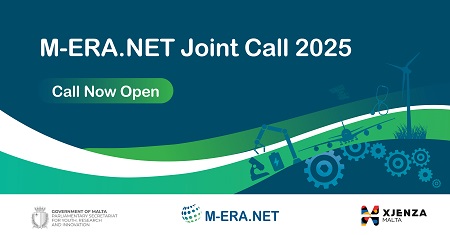
Source of Funding: Xjenza Malta
Funding Opportunity for Malta-based Researchers to Innovate in Advanced Materials & Battery Technologies – Apply Now!
M-ERA.NET is a European-funded initiative that supports research and innovation in materials science and battery technologies, aligning with the European Green Deal. The M-ERA.NET Joint Call 2025 is now open click to view call— with particular emphasis on clean energy technologies, future batteries, circular economy, and the integration of digital technologies.
Funding Opportunities:
Malta-based entities are eligible to apply for up to € 300,000 in funding, allowing them to join a consortium and submit a proposal for this Call (N.B. if multiple national partners are included in a single consortium, the total funding for all Maltese participants combined cannot exceed the €300,000 cap).
Apply under focused thematic areas:
- Sustainable Materials for Energy Applications
- Innovative Surfaces, Coatings, and Interfaces
- Advanced Composites and Lightweight Materials
- Functional Materials
- Materials Addressing Environmental Challenges
- Next Generation Materials for Electronics
Eligibility & Application Process
To be eligible, applicants must:
- Carefully review the Call text 2025 and Guidance for applicants: Click to view the call text 2025 and Guidance
- Be a Malta-based entity, including private and public organisations, Research & Knowledge Dissemination Organisations (RKDOs), and other, with an operating base in Malta in accordance with the click to download the State Aid or click to download the Non-State Aid National Rules for Participation;
- Complete and submit a National Application Form duly signed and supported by the required Annexes. These can be downloaded from the Xjenza Malta click to visit the Resource Page (Application Resources).
Application Deadlines
- Project coordinator needs to submit the pre-proposal via the M-ERA.NET Electronic Submission System by the 13 May 2025, 12:00 CET
- Each Malta-based applicant must submit a National Application Form to xjenzamalta@gov.mt by the 13 May 2025, 23:59 CET.
Call webinars
- Announcement: M-ERA.NET Call 2025 information webinar on 25 March 2025, 12:00 – 13:30 (Brussels time) – Registration link soon available
M.ERA-NET website: https://www.m-era.net/
For more information, please contact us at eusubmissions.xjenzamalta@gov.mt / +356 23602152
Information and image source:
Call for Proposals RFCS-2025-JT-Big Tickets for Coal
Source of Funding: European Commission
Project results are expected to contribute to all the following impacts:
- Contribute to achieving the European Green Deal goals.
- Demonstrate overall positive environmental and, if relevant, health and safety impact of the technology and/or the approach pursued.
Expected Outcome:
Project results are expected to contribute to all the following outcomes:
- Contribute to the ambitious targets of the European Green Deal.
- Outline a continuation plan for technology scalability and greater expansion, ultimately linked to a viable business case.
- Provide high visibility dissemination of lessons learnt and continue to contribute to the development of skills and creation/conversion of jobs.
Objective:
The RFCS Research Programme (Council Decision (EU) 2021/1094) has the following research objectives for the coal sector:
- supporting the just transition of the coal sector and regions (Article 4).
- improving health and safety (Article 5).
- minimising the environmental impacts of coal mines in transition (Article 6).
The call objectives are:
- Repurposing of formerly operating coal and lignite mines or those in the process of closure and coal-related infrastructure including power supply services.
- Materials and waste reuse, and development of alternative materials, including recovery of critical raw materials.
- Land monitoring, modelling, stabilisation and/or restoration.
- Processing of methane emissions.
- Monitoring, management and/or treatment of mine water and water tables in coal mines in the process of closure and formerly operating mines.
Scope:
Applicants may submit proposals for either pilot or demonstration projects (see Articles 15 and 16 of Council Decision 2008/376/EC).
Proposals must be in line with Council Decision (EU) 2021/1094.
Proposals should address the application of innovative technologies related to one or two of the five call objectives listed above. If addressing two call objectives, proposals should clearly identify which work packages address which call objective(s).
Proposals must include an exploitation strategy outlining possible integration of the deliverables of the project (including the pilot/demonstrators) in an industrial environment and a preliminary assessment of their economic viability. Where relevant, they can also describe activities related to economic analysis for the purposes of constructing a business case or new business models.
Activities are expected to achieve technology readiness level 7-8 (TRL 7-8) by the end of the project.
In line with Article 2 of RFCS Council Decision (EU) 2021/1094, research and technological development funded under the RFCS must be in line with the Just Transition Mechanism goals.
Proposals will have to demonstrate how they will support the social and economic revitalisation of the former coal mine regions, in line with the relevant Territorial Just Transition Plans. Proposals must involve the local community and focus on communication with stakeholders, including the public.
Proposals are expected to include activities to:
- promote the development of efficient reskilling and upskilling programmes for workers affected by a coal phase-out, including research on the training and reskilling of workers employed or previously employed in the coal sector, in accordance with Article 4 (e) of RFCS Council Decision (EU) 2021/1094.
- address potential solutions that improve working conditions for employees of the coal mines being phased out, in particular health, safety, and ergonomics in and around the workplace, in accordance with Article 5 of RFCS Council Decision (EU) 2021/1094.
Visit the below link to read further.
Information source:
Call for Proposals RFCS-2025-CSP-Big Tickets for Steel
Source of Funding: European Commission
Expected Impact:
Project results are expected to contribute to the following impact:
- Contribute to the ambitious targets of the European Green Deal and the set of European Commission policy guidelines applicable to the steel industry for full decarbonisation of the steel sector.
Expected Outcome:
Project results are expected to contribute to all the following outcomes:
- Contribute and clearly quantify the CO2 reduction achieved in the steel sector or in the target group.
- Make it technically and economically feasible for novel technologies and processes to produce the same products as current industrial processes, as demonstrated and validated at suitable scale.
- Demonstrate overall positive environmental and, if relevant, health and safety effects of the technology and/or the approach pursued.
- Outline a plan for technology scalability and greater expansion, ultimately linked to a viable business case.
- Provide high visibility dissemination of lessons learnt and continue to contribute to the development of skills and creation/conversion of jobs.
Objective:
The RFCS Research Programme (Council Decision (EU) 2021/1094) has the following research objectives for the steel sector:
- new, sustainable and low-carbon steelmaking and finishing processes (Article 8).
- advanced steel grades and applications (Article 9).
- conservation of resources, protection of the environment and circular economy (Article 10).
- management of work force and working conditions (Article 10a).
The call objectives are:
- Cross cutting issues: digitalisation, skills and social innovation in the steel sector.
- CO2 neutral iron ore reduction (Increasing the use of pre-reduced iron carriers).
- Technologies to improve energy efficiency, increase heat recovery and enhance process integration (PI) approaches in steel production.
- Advanced steel alloys for special applications.
- Circular economy and sector coupling solutions to meet the zero-waste goal for steelmaking.
- Carbon capture of steel CO/CO2 gases.
Scope:
- Applicants may submit proposals for either Pilot or Demonstration projects (see Articles 15 and 16 of Council Decision (EU) 2008/376/EC).
- Proposals are expected to achieve technology readiness level 7-8 (TRL 7-8) by the end of the project. Research activities must take account of the requirements of the selected TRL levels.
- Proposals must be in line with the general and specific objectives listed in the Memorandum of Understanding for the European partnership on Clean Steel launched in Horizon Europe.
- Proposals need to show in the excellence and/or impact part of the application form how they contribute to the multiannual strategic R&I agenda of the Clean Steel Partnership.
- Proposals must address the application of innovative technologies related to one or two of the six call objectives listed above. If addressing two call objectives, proposals should clearly identify which work packages address which area(s) of which call objective(s).
- Proposals must include an exploitation strategy outlining possible integration of the outcomes of the project (including the pilot/demonstrators) in an industrial environment and a preliminary assessment of their economic viability.
- When addressing the call objectives, proposals should pay particular attention, where relevant, to Article 10a of RFCS Council Decision (EU) 2021/1094 and, more precisely, include activities to address potential solutions that can improve the working conditions of employees at steelmaking facilities, in particular health, safety and ergonomics in and around the workplace.
- Targeted improvements (compared to the existing installation or, for new projects, to the relevant ETS benchmark) must be clearly quantified and demonstrated with energy system and materials balance assessments (including emissions) clearly defined by the applicants. This requirement applies to all the call objectives, with the exception of objective 1.
- Collaborations with start-ups and small and medium-sized enterprise are encouraged.
Visit the below link to read further.
Information source:
Joint Transnational Call 2024 The Clean Energy Transition Partnership
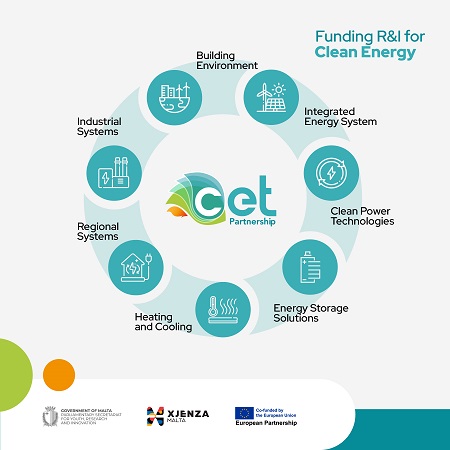
Source of Funding: CETPartnership
The Clean Energy Transition Partnership (CETPartnership) is a multilateral and strategic Horizon Europe partnership with the aim of empowering the energy transition and contributing to the EU’s goal of becoming the first climate-neutral continent by 2050.
The 2024 CETPartnership Joint Call is a 2-stage call structured around the following Call Modules. The call modules describe specific topics and/or challenges that applicants shall address in their project proposal. Applicants must choose and apply under a specific call module when submitting their project proposal. Evaluation and ranking of the project proposals will be performed separately per call module.
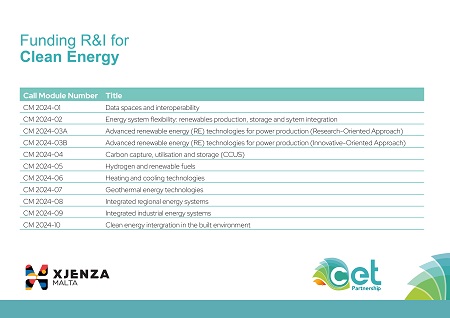
Entities in Malta are eligible for funding in all call modules, with the option of requesting up to €500,000 to participate in CETPartnership proposal consortia. It is to be noted that if more than one national partner is present in one consortium, the total amount of funding for the participating national partners cannot exceed the €500,000 cap.
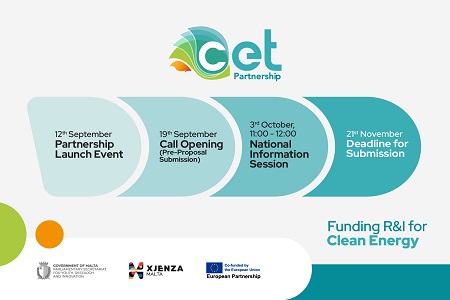
To view call specifications and guidelines please visit the below link.
Please find recording of the information session below:
For further information please contact the programme officers Ms Christy Baldacchino at christy.baldacchino.2@gov.mt, (+356) 2360 2158 and/or Mr Stefan Montebello at stefan.montebello.1@gov.mt, (+356) 2360 2212.
Information and images source:
Call for proposals for access to integrated multidisciplinary facilities for Materials and Biomaterials
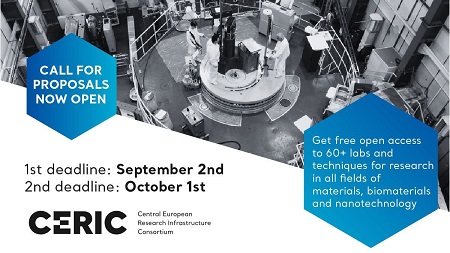
Source of Funding: Central European Research Infrastructure Consortium (CERIC)
CERIC-ERIC offers access through a single entry point to more than 60 different and complementary state of the art techniques and support laboratories, distributed in 11 countries, with the submission of single or multi-technique proposals. A detailed description of the facilities available in CERIC can be found here.
Access to CERIC is open to scientists from all over the world and free of charge, provided the results end data are made available to the community in a reasonable time, according to our Scientific Data Policy.
- September 2nd 2024 at 17:00 CEST to have a pre-evaluation and the possibility to improve your proposal
- October 1st 2024 at 17:00 CEST final submission, recommended only for users that are expert in all the techniques requested.
Visit the below link to read further.
Information and image source:
Clean Energy Transition Partnership: Joint Call 2023
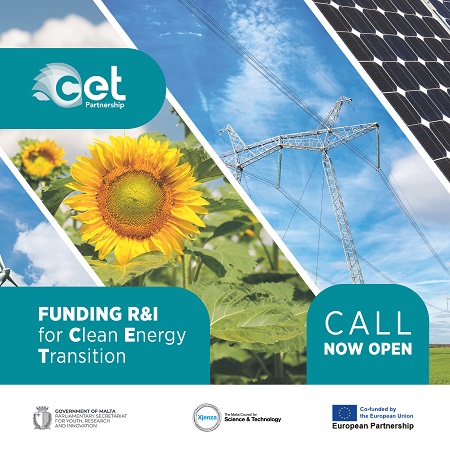
Source of Funding: Malta Council for Science and Technology
The Clean Energy Transition Partnership (CETPartnership) is a multilateral and strategic Horizon Europe partnership with the aim of empowering the energy transition and contributing to the EU’s goal of becoming the first climate-neutral continent by 2050.
The 2023 CETPartnership Joint Call is a 2-stage call structured around 12 call modules. The call modules describe specific topics and/or challenges that applicants shall address in their project proposal. Applicants must choose and apply a specific call module when submitting their project proposal. Evaluation and ranking of the project proposals will be performed separately per call module.
| Call Module Number | Title |
| 2023-01 | Direct current (DC) technologies for power networks |
| 2023-02 | Energy system flexibility: renewables production, storage, and system integration |
| 2023-03A | Advanced renewable energy technologies for power production (Research-Oriented Approach) |
| 2023-03B | Advanced renewable energy technologies for power production (Innovation-Oriented Approach) |
| 2023-04 | Carbon capture, utilisation, and storage (CCUS) |
| 2023-05 | Hydrogen and renewable fuels |
| 2023-06 | Heating and cooling technologies |
| 2023-07 | Geothermal energy technologies |
| 2023-08 | Integrated regional energy systems |
| 2023-09 | Integrated industrial energy systems |
| 2023-10A | Clean energy integration in the built environment (Research-Oriented Approach) |
| 2023-10B | Clean energy integration in the built environment (Innovation-Oriented Approach) |
Entities in Malta are eligible for funding in all call modules, with the option of requesting up to €500,000 to participate in CETPartnership proposal consortia. It is to be noted that if more than one national partner is present in one consortium, the total amount of funding for the participating national partners cannot exceed the €500,000 cap.
Visit the below link to download the guidelines and application forms.
The presentation given during the info session held on 10th October 2023 can be downloaded from here, while the recording can be followed here: Call Text and National Considerations.
Information and image source:
CO2-neutral steel production with hydrogen, secondary carbon carriers and electricity OR innovative steel applications for low CO2 emissions (Research Innovation Action) HORIZON-CL4-2024-TWIN-TRANSITION-01-46
Source of Funding: Horizon Europe
HORIZON-CL4-2024-TWIN-TRANSITION-01-46: CO2-neutral steel production with hydrogen, secondary carbon carriers and electricity OR innovative steel applications for low CO2 emissions (Research Innovation Action) – Portfolio topic covering two independent technology areas, with an overall available budget of 20 M€.
Enhance CO2-neutral steel production with hydrogen, secondary carbon carriers and electricity
Expected Outcomes:
- Introduce the use of secondary carbon sources in the steelmaking process.
- Combine the reduction of fossil carbon-related emissions with improvements in the materials and energy flows.
- Adapt to the use of low-CO2 hydrogen for heating in rolling, shaping, and heat treatment, considering also a coupling between hydrogen and/or electrical heating and fuel-flexibility concepts.
- Valorisation of non-conventional ores, e.g., in (photo)electrolysis processes.
- Substitution of fossil sources as carburiser and slag foaming agent in electric arc furnaces (EAF).
- Pre-reduction or reduction smelting with hydrogen and/or electricity for residues.
- Identify and analyse the amount of European existing technologies that could be efficiently retrofitted to CO2 neutral solutions (e.g. H2 DRI).
OR
Contribute to innovative steel applications for low CO2 emissions
Expected Outcomes:
- New or modified alloying concepts, downstream processing and manufacturing processes for new clean steel grades.
- Manufacture steels with improved life cycle contributions to CO2 emissions reduction.
- Clean steel grades with improved in-use properties.
- Innovative simulation methods and tools to accelerate development of clean steel grades.
- Advanced grades of steel for use in efficient high temperature processes.
- Advanced grades of steel for use in the railway's systems of high-speed trains.
- High-performance structural steels not containing critical strategic elements and/or characterized by increased tolerance to the content of contaminants in the scrap.
- Steel grades with increased use of low-quality input materials.
Call Opening Date: 19 September 2023
Application Deadline: 7 February 2024
Visit the below link for further details.
Information source:
Digital transformation and ensuring a better use of industrial data, which can optimise steel supply chains (Innovation Action)(HORIZON-CL4-2024-TWIN-TRANSITION-01-44)
Source of Funding: Horizon Europe
HORIZON-CL4-2024-TWIN-TRANSITION-01-44: Digital transformation and ensuring a better use of industrial data, which can optimise steel supply chains (Innovation Action) – Available budget 10 M€.
Expected Outcomes :
- Awareness and effectivity for total safety and CO2 reduction through digital transition with better use of data.
- Extension of inline and real-time tools to monitor the process and stay into the optimal window.
- Enhancement of the in-line classification of feedstock and intermediate products through the continuous analysis of composition and bulk properties by considering the assembly of sensors, specific models, and advanced data processing.
- Increasing data sharing in steel plants to realise the seamless digital integration of the value chain and the interoperability of systems and tools by implementation of existing and enhanced standardised protocols.
- Novel sensors and models for real-time process control and energy forecasting to match demand and offered energy mix. The expected outcome is an enhanced merging of planning activities and approaches to run plant processes.
- Application of digital technologies and methods to develop decision-supported planning and process monitoring tools operable in offline or online modes.
- Traceability of materials and process information throughout the value chain for product quality, efficiency and process integration control (including multi-scale modelling of structure, and structure vs. properties correlations).
Call opening on 19 September 2023
Application Deadline: 7 February 2024
Visit the below link to read further.
Information source:
